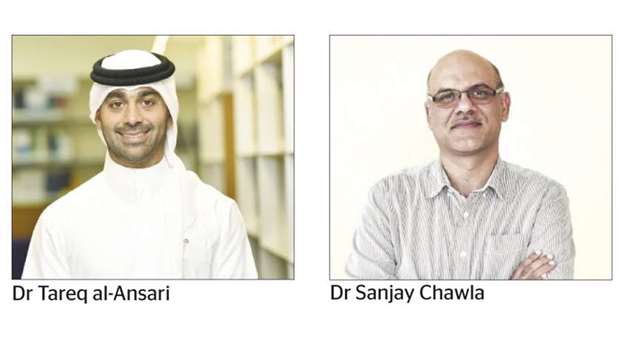The emerging field of artificial intelligence (AI) can help countries improve their food security, especially in places like Qatar that import a majority of their food products from outside, according to Dr Tareq al-Ansari, assistant professor at Hamad Bin Khalifa University (HBKU)’s College of Science and Engineering.
“While Qatar has significantly ramped up its production of vegetables, meat and dairy products, a large percentage of our food products are still being imported. The availability and stability of food supply are still of particular concern. Therefore, it’s important to develop data-driven strategies to secure multiple sources from where food is acquired through robust and diversified supply chains,” said Dr al-Ansari, whose research focuses on the water-energy-food nexus and sustainable development.
“There is a need for informed, insightful and pre-emptive decision-making processes in the field of food security, and we strongly believe artificial intelligence can enable this and play an important role for a more sustainable and resilient future in the local food sector,” he added.
Dr al-Ansari is closely working with the Qatar Center for Artificial Intelligence (QCAI) at Qatar Foundation (QF)’s HBKU to develop the latest AI tools and technologies to enhance food production in Qatar. This involves using satellite imaging through drones, data sets from large farms, and analysis of food supply chains to identify risks and opportunities.
“There is scope for new opportunities within the AI-enabled food system in Qatar, including (a) precision agriculture to manage large farms efficiently; (b) high-quality and nutritious crop breeding; (c) early warning of pest invasion and crop diseases, and (d) increased transparency in food supply chains, with waste minimisation and reverse logistics,” added Dr al-Ansari.
One of the projects QCAI and HBKU’s College of Science and Engineering are working collaboratively on is related to farm boundaries, which involves using AI to detect boundaries of farms and calculate crop yields.
According to Dr Sanjay Chawla, research director at QCAI, AI-generated data about food systems help governments around the world make wise decisions and policies.
“Reports about yield estimates are routinely created and sent to different government officials, aggregated up to the political leadership, and decisions made based on them, like what to import, how much to import, and how much export to allow,” said Dr Chawla.
He added that AI-based projections regarding food production and distribution are strengthened with the amount of real-time data they are based on. His team and peers at HBKU are actively fostering collaborations to aggregate more data in Qatar and strengthen its AI capabilities.
“These AI models are very data-hungry. The more data you give them, the better they perform,” added Dr Chawla.
One such partnership is HBKU’s research collaboration with Norway-based firm Yara International ASA, the world’s leading crop nutrition company and provider of environmental solutions.
“We are developing automation and artificial intelligence systems with the support of Yara International through the ‘water saving greenhouse’,” said Dr al-Ansari. “Data related to the microclimate, plant health and diseases, and water-related parameters are being acquired. This will ensure high productivity of nutritious food in a resilient manner all year round.”
Dr al-Ansari added that while Qatar is advancing in the field of AI and food security, there is still a lot more investment needed in this rapidly transforming field and various challenges to be tackled, especially in regard to overcoming data scarcity and accessibility in the region.
“The other difficulty is to conceive, design and implement AI systems that could work together with humans to protect their well-being and the environment we live in. Thus, HBKU is placing emphasis on transparency to make AI systems and decisions explainable, including the risks of digitalisation, and inclusive and bias-free progress, supporting diverse demographics and food cultures in the Arab region,” he said.
Moving forward, HBKU’s work in AI and food security is envisaged to develop a multi-screen system called the Food Security Decision Platform that will consolidate and display information related to local production, domestic markets, strategic reserves and international trade.
This platform will be used by the Qatari government to gain insights and recommendations for developing future food security and resilience plans, according to a press statement by QF.
“It is vital that Qatar continues to investigate and adopt trending technologies like Internet of Things and AI to work hand-in-hand with the local farmers and other stakeholders to grow food within its borders through appropriate choices and increase indigenous food supply,” it was observed.

..
